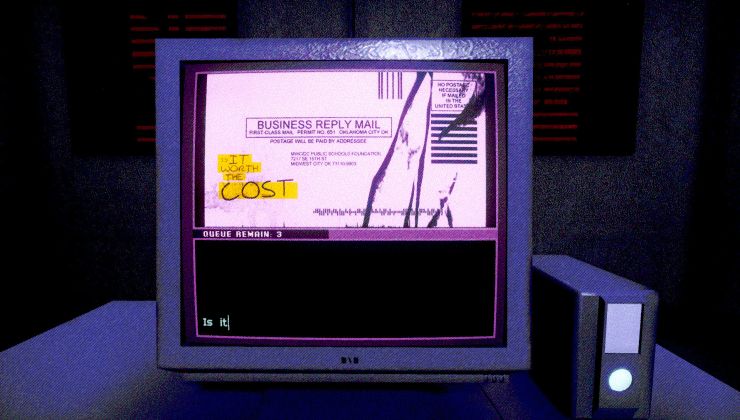Were you hoping to easily play Fortnite on the upcoming Steam Deck? Well, Tim Sweeney the Epic Games CEO has made it clear that it's not going to happen officially. The thing to remember right now is that both Easy Anti-Cheat and BattlEye do support Linux. Both for native Linux builds and for Windows games run through Steam Play Proton. However, it's all user-space with no Kernel modules.
On Twitter, user Stormy178 asked if there were plans to make Fortnite compatible with Steam Play Proton to which Sweeney replied:
Fortnite no, but there's a big effort underway to maximize Easy Anti Cheat compatibility with Steam Deck.
The questioning continued and when asked why, Sweeney followed up with:
We don’t have confidence that we’d be able to combat cheating at scale under a wide array of kernel configurations including custom ones.
Another user mentioned it seemed that Epic's CEO didn't trust their own product, Sweeney obviously couldn't let that remain unanswered with:
With regard to anti-cheat on the Linux platform supporting custom kernels and the threat model to a game of Fortnite's size, YES THAT'S EXACTLY RIGHT!
In a number of ways, he's actually right. Windows is closed source, so is the NT Kernel and usually 99% of drivers for it are too. Client-side anti-cheat obviously relies a lot on security by obscurity, so people can't see everything it's doing. This is part of the problem on Linux, where the Kernel and practically all development on it is done right out in the open and it changes rapidly. Developing anti-cheat against such an open Kernel probably isn't going to be even remotely easy. There will be ways though, especially if something like the Steam Deck had a fully signed Kernel and some sort of guarantee it's being used - probably numerous ways smarter people know of.
Really though, overall it doesn't give a lot of confidence for developers who might be looking to hook up their anti-cheat ready for their games to work on the Steam Deck.
The big difference it seems, is the size of the playerbase and how much of a target each game is. Sweeney is not saying it's not suitable as a whole, just that Fortnite is a massive target for cheaters:
The threat model for anti-cheat varies per game based on the number of active players and ability to gain profit by selling cheats or gain prominence by cheating. Hence anti-cheat which suffices for one game may not for another game with 10, 100, or 1000 times more players.
One user followed up by suggesting it was just a case of Sweeney not wanting Fortnite on a "rival's platform", to which Sweeney gave this answer:
Epic would be happy to put Fortnite on Steam. We wouldn't be happy to give Steam 20-30% of its revenue for the privilege. Supporting Steam Deck hardware is a separate issue, but the market for non-Steam-hosted games on limited availability Steam Deck hardware is how big exactly?
With that in mind, you're going to need Windows or to stream it via GeForce NOW on the Steam Deck. At least for games without such anti-cheat, you should be able to use the Heroic Games Launcher on the Steam Deck.
It does mean there's space open for another game to take its place on the Steam Deck officially.
the more users linux have, the more likely it is that many game developers will support it.
at the same time, the more players an specific game have, the less likely it is that it will support linux.
what about server side anti cheat? its possible to do the validation server only?
"With that in mind, you're going to need Windows or to stream it via GeForce NOW on the Steam Deck."
again, what about server side anti cheat?
anyway, people still can play fortinite on their phones, so its not a massive loss...
wait a minute, isnt android linux based?
in any case, fortinite has 250 millions of players, that alone might be enough to kill steamOS.
imagine if steamdeck sell as much of an switch, but most players install windows on it to play fortinite, sigh.
what about server side anti cheat? its possible to do the validation server only?Ish. For some games server side anti-cheat is perfect, with no downsides. But if you can push more of the work to the client then the player gets better performance, better latency, and the user pays the electricity costs rather than you. So you can try to really nail down the absolute minimum information that you pass to the client, and check every interaction against a definitive server game state... or you just bung everything at the client and try to stop the client being tampered with.
Server-side anti-cheat can't stop someone from just pointing a camera at the screen, but client-side anti-cheat can't, either.
the absolute minimum information that you pass to the client
There are cheats in the game "Escape from Tarkov" that lets you see the content of the inventory of every player on the map. Those cheats are well known, not just hearsay. One has to ask why the frick a developer transmits the content of every inventory to every player on the map. This is either ridiculously stupid... or they are selling their own cheats. I really hope they just don't know what they're doing.
Strange how the insecure Windows, which is targeted by every malware out there is actually more secure for anti-cheat :-Dcompletely different thing.
one thing is to find an way to run insecure code in an kernel, exploiting its security holes, that is what windows malwares do, the malware capabilities will be limited by the size of the hole, for example, maybe they can control some components of the kernel but no others, and maybe they can do what they want to do without the need of touching the kernel.
on linux on the other hand, you have full access to customize your own kernel code.
you dont need an malware exploiting kernel features to dodge the anti cheat, you can rewrite the code of the kernel to exploit it!
If they had the anti-cheat software open, it could benefit from free fixes done by the people in open source community.that is like having an open source password.
security by obscurity DO WORK for passwords.
It's not a coincidence that the best security libraries are open source (and the linux is dominating the server world).its not a matter of security here, its a matter of freedom, open source softwares is great to allow the user to do whatever he want, and doing whatever he want in that context is CHEATING on an online game.
anti cheat software is akin to proprietary in the sense that it want to limit what the user can or cant do, its also akin to DRM.
He doesn’t have to support all the various kernel configs, just the official SD one. Isn’t that what the chain of trust is for? Detect signed software and work, don’t and don’t.
in that case, fortinite would be an steamdeck exclusive in the context of linux...
I would love to know how much cheating from Linux users there are on something like Overwatch who have their own cheat prevention.
the issue is not that linux users use cheat, its that cheaters may start using linux just to cheat.
and that is not a big problem if you only find one cheatter in ever 1000 matches that you do, its anoying but rare enough that it dont make a difference.
its another thing if you find an cheater in lets say 1 in every 10 matchs.
...True.
My concern is now, that no developer or publisher will even bother to use the Linux/Wine/Proton enabled AC because of Tim's statement. Why taking the risk at all, if not even the company that creates it has enough convidence to use it in their own products and is vocal about it?
I'm not buying it. Sweeney says a lot of stupid stuff to win an argument. Especially around Linux.
"Sweeney is not saying it's not suitable as a whole, just that Fortnite is a massive target for cheaters"
I rest my case. This is so stupid, I'm out of words. Who believes crap like that?
(I want to add that I'm not saying that Sweeney is generally dumb or doesn't have knowledge about game development. I'm just saying that he has a very strong opinion, and starts to lie his way through an argument until he thinks he won it. There are people like that, and Sweeney is just one example. He's human after all.)
dude fortinite alone has 250 millions of players, and the cheating industry move more money than the entire linux gaming industry (if we assume its 100 smaller than the windows gaming industry)
so yes, he might be right.
i cant remember where i saw the cheating numbers, i think it was one of the valve conferences arround anti-cheating.
the malware capabilities will be limited by the size of the hole
Are you sure you understand this topic well enough to explain it to others? If you ask me, this is a very misleading simplification of how bugs and exploits work. The size of holes is important in the physical world, but that doesn't really make sense in the digital world. Any bug can lead to full permissions. It really depends.
that is like having an open source password.
security by obscurity DO WORK for passwords.
That's a very unfitting comparison. Locks should be open source, but the keys of course not. It wouldn't make any sense otherwise.
dude fortinite alone has 250 millions of players, and the cheating industry move more money than the entire linux gaming industry (if we assume its 100 smaller than the windows gaming industry)
so yes, he might be right.
i cant remember where i saw the cheating numbers, i think it was one of the valve conferences arround anti-cheating.
What's your argument? He might be right because the player count is high?
its another thing if you find an cheater in lets say 1 in every 10 matchs.
I'm not sure what kind of games you're playing, but in some games, cheating is already at this level, and worse. Ever played PUBG or Apex?
Strange how the insecure Windows, which is targeted by every malware out there is actually more secure for anti-cheat :-Dcompletely different thing.
one thing is to find an way to run insecure code in an kernel, exploiting its security holes, that is what windows malwares do, the malware capabilities will be limited by the size of the hole, for example, maybe they can control some components of the kernel but no others, and maybe they can do what they want to do without the need of touching the kernel.
on linux on the other hand, you have full access to customize your own kernel code.
you dont need an malware exploiting kernel features to dodge the anti cheat, you can rewrite the code of the kernel to exploit it!
You can do the same on Windows, it's just more difficult. I don't thing even on Linux most cheaters would ever want to mess with their kernel, just to be able to cheat in some game.
If they had the anti-cheat software open, it could benefit from free fixes done by the people in open source community.that is like having an open source password.
security by obscurity DO WORK for passwords.
Passwords are not software (it's just string and the servers should only store hash and add salt as well), so I don't think the anti-cheat software is just password that should benefit from security by obscurity.
It's not a coincidence that the best security libraries are open source (and the linux is dominating the server world).its not a matter of security here, its a matter of freedom, open source softwares is great to allow the user to do whatever he want, and doing whatever he want in that context is CHEATING on an online game.
anti cheat software is akin to proprietary in the sense that it want to limit what the user can or cant do, its also akin to DRM.
This is a correct point, but the freedom of one person ends where freedom of others begins. I don't care if people are cheating in online games at all, it's their choice, but they should do it with the permission of others. I cheated multiple times with my friends on LAN parties, but just for fun and with them knowing.
It will be best to just put cheater in the same match with other cheaters, so they can have fun together.
I can't believe it... this statement renders all efforts from Valve bringing these games to Linux or the Deck worthless...
calm down, not all games have an install base as big as fortinite, in fact fortinite is the biggerst one.
if an game has lets say 1~10 millionss of users it may worth support linux.
He doesn’t have to support all the various kernel configs, just the official SD one. Isn’t that what the chain of trust is for? Detect signed software and work, don’t and don’t.Is this already possible?
Does Valve "sign" the Deck kernel?
Epic had chances to promote their Fortnite and store on Linux, but they refused themselves, so they go to hell.
The Poles with GOG had enough time to meet the audience, who most of all promoted the position of DRM-free. But for years they've been wiping their feet on us, so go to hell.
Humble.. Well, just go to hell.
As a result, on Linux we have only two time-tested stores that really care about the platform: Steam and itch.io
dude...
people already have an big game library on GOG, epic, etc, if those stores dont work on linux, most people will dump linux rather than the store.
fortinite alone has 250 millions of players, that is more than 10x what linux have of users, what is the most likely scenario here?
that steam deck sell a lot but most people install windows on it, sell a lot and people keep steamOS on it, or it flop?
Are you sure you understand this topic well enough to explain it to others? If you ask me, this is a very misleading simplification of how bugs and exploits work. The size of holes is important in the physical world, but that doesn't really make sense in the digital world. Any bug can lead to full permissions. It really depends.
That's not correct. Some holes can indeed lead to privilege escalation and thus provide full access to the whole machine, while other holes are more or less limited in what they can do. It's not a given that a bug/exploit will lead to total foobar. It's as you say at the end: it really depends.
What's your argument? He might be right because the player count is high?
The argument is that the bigger a player base is for a game, the more lucrative a target it is for cheat developers and cheat consumers alike. Even a minuscule 1% of cheating players amounts to a very different number in a game with 10,000 players versus a game with 250 million players.
calm down, not all games have an install base as big as fortinite, in fact fortinite is the biggerst one.
if an game has lets say 1~10 millionss of users it may worth support linux.
Exactly. The fact alone that Epic a.k.a. Tim Sweeney has already collaborated with Valve to bring official EAC support to Proton and the Steam Deck points to him at least sincerely believing what he says about Fortnite. He didn't block Proton from using EAC, it's rather the opposite, even though he could. And after all, EAC is one product (and its use affects the game companies that opt to enable it, not Epic) and Fortnite is another product - a company can have vastly different strategies for its different products, according to the target market for them.
That's not correct. Some holes can indeed lead to privilege escalation and thus provide full access to the whole machine, while other holes are more or less limited in what they can do. It's not a given that a bug/exploit will lead to total foobar. It's as you say at the end: it really depends.
Exactly. I said it depends. You're essentially agreeing with what I said, yet you're stating that what I said is incorrect.
The argument is that the bigger a player base is for a game, the more lucrative a target it is for cheat developers and cheat consumers alike. Even a minuscule 1% of cheating players amounts to a very different number in a game with 10,000 players versus a game with 250 million players.
I already explained above why this argument is a stupid one. Yes, the statement is correct if you look at it isolated from the context, but it doesn't make sense the way he's using it in his argument. That's a common tactic. Say something that is obviously correct, then misuse that in an incorrect argument and hope that people fall for it.
dude fortinite alone has 250 millions of players, and the cheating industry move more money than the entire linux gaming industry (if we assume its 100 smaller than the windows gaming industry)
so yes, he might be right.
i cant remember where i saw the cheating numbers, i think it was one of the valve conferences arround anti-cheating.
What's your argument? He might be right because the player count is high?
i cant believe i have to explain something so simple...
why companies dont invest on linux?
if you port your game to switch, the port cost may be arround "10 millions", but you may earn "100 millions" after the port, if you port to pc, the port cost may be "10 millions" but you earn 150 million after the port.
if you port to linux, the port cost may be 10 million, but you earn 150 thousand dollars, in other words, you spend more porting an game than you eared!
its the same for cheating.
the reason why we have millions of cheaters is not because millions of people know how to hack, its because a few people do, those people make cheating solutions and sell then in the market.
no one will spend time trying to hack an game that has 10 users, unless its dirty easy to hack it (any kid can do type of hacking)
but if one game has dozens or hundreds of millions of players, then you may hire an entire team of hackers, the cost to hack it will be higher (because the company who make the game invest a lot of money in defense) but the profits for hacking it will be higher too.
its another thing if you find an cheater in lets say 1 in every 10 matchs.
I'm not sure what kind of games you're playing, but in some games, cheating is already at this level, and worse. Ever played PUBG or Apex?
due, i'm not saying 10 is the exactly number, i dont know what the break point is for each human being, what is the point that he give up playing something, it will vary from person to person, i was just quoting a few numbers to explain the point, not trying to inform the exact number where everything breaks.
i'm not paid to comment on the internet so i will not waste hundredes of hours doing research to reply something.










 How to set, change and reset your SteamOS / Steam Deck desktop sudo password
How to set, change and reset your SteamOS / Steam Deck desktop sudo password How to set up Decky Loader on Steam Deck / SteamOS for easy plugins
How to set up Decky Loader on Steam Deck / SteamOS for easy plugins
See more from me